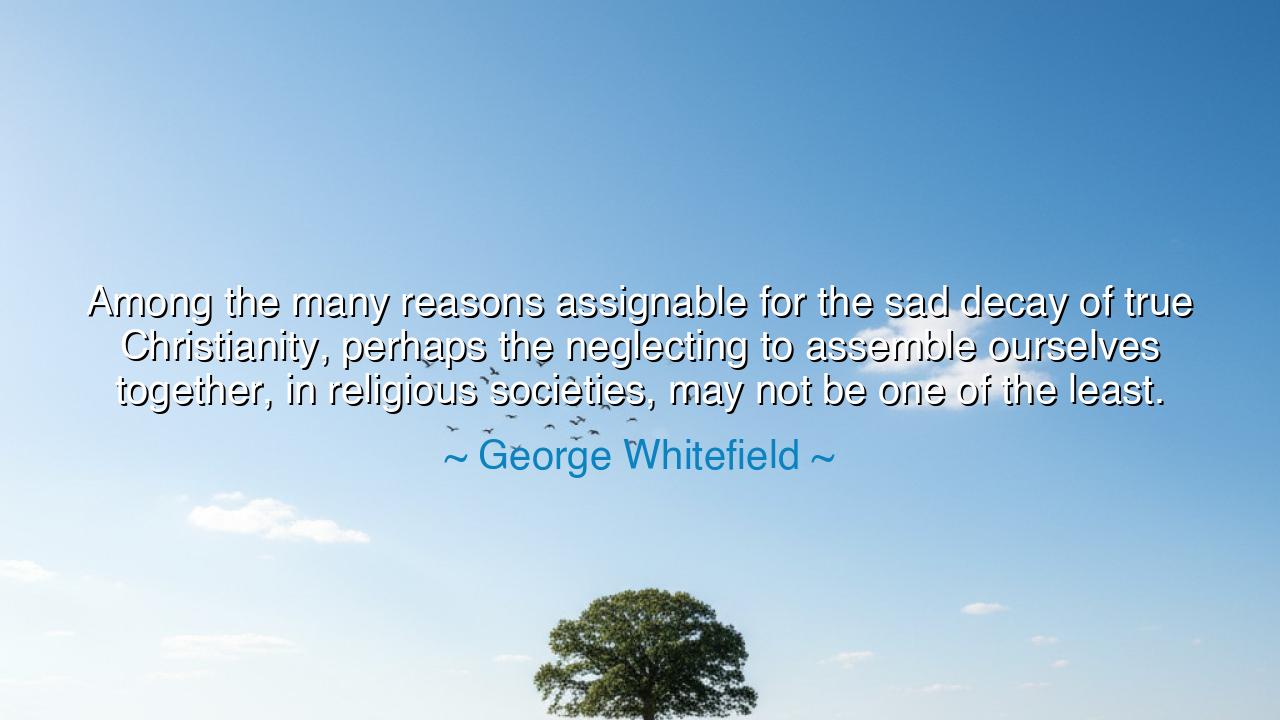
Among the many reasons assignable for the sad decay of true
Among the many reasons assignable for the sad decay of true Christianity, perhaps the neglecting to assemble ourselves together, in religious societies, may not be one of the least.






There are times when the fire of faith dims, not because the heavens have closed, but because the hearts of men have grown cold in isolation. In his solemn reflection, George Whitefield declared, “Among the many reasons assignable for the sad decay of true Christianity, perhaps the neglecting to assemble ourselves together, in religious societies, may not be one of the least.” These words, drawn from the fervor of the eighteenth century, still speak to the soul of every age. Whitefield, a herald of revival during the Great Awakening, had seen with his own eyes how faith withers when believers live apart, and how it burns bright when they gather as one. For he understood that community is the breath of the spirit, and solitude, when stretched too far, can starve the soul.
In his time, Whitefield walked among congregations that had grown weary, where religion had become more form than flame. Churches stood tall, but the hearts within them were often hollow. He saw that men prayed alone but rarely worshiped together; they spoke of God but seldom shared His presence. Thus he lamented a “decay of true Christianity”—not the loss of doctrine, but the fading of communion. The strength of faith, he knew, lies not merely in personal belief but in the fellowship of souls who together remember what the world forgets: that they are not alone, and that in unity lies both comfort and courage.
From the beginning of time, humankind has been called to gather. The ancient Israelites journeyed through the desert as a people, not as wanderers. Christ Himself taught not to a single disciple, but to twelve—and through them, to thousands. After His ascension, it was in the upper room, when they “were all together in one accord,” that the Spirit descended upon them like tongues of fire. This was the divine pattern Whitefield sought to restore: that faith was never meant to be a solitary echo, but a chorus of hearts. To neglect assembling together, he warned, is to silence that chorus—and in silence, the enemy of faith finds his strength.
Throughout history, the decline of any noble cause has often followed this same pattern: disunity before decay. The Roman Republic fell when its citizens ceased to see themselves as one body. The early monastic orders, once radiant with purpose, grew corrupt when each monk pursued his own comfort instead of communal devotion. Likewise, in religion, when men forsake the gathering of hearts, the warmth of shared conviction cools into habit, and habit, left untended, decays into emptiness. Whitefield’s cry was therefore both spiritual and prophetic—a call not only for prayer, but for presence, for the rekindling of fellowship among the faithful.
Consider the story of the early Methodists, whose movement Whitefield helped to ignite. They did not build grand cathedrals, but small “societies” where men and women met to pray, to sing, to confess, and to lift one another. From those humble gatherings spread a renewal so great it reached across oceans and centuries. Their strength was not in numbers or eloquence, but in togetherness. Each meeting was a forge where faith was tempered by companionship, where the weary found renewal in the light of their brothers and sisters. Whitefield saw this and knew: when believers assemble, even the smallest room becomes a cathedral, and the weakest heart is made strong.
In his words lies a wisdom that transcends religion itself. For even outside the church, the human soul withers in isolation. The poet, the scholar, the laborer—all thrive when bound to others by shared purpose. A tree may grow alone, but a forest endures storms because its roots intertwine. So too with faith and morality: when men gather to remind one another of what is good, the decay of virtue is delayed; when they scatter and grow silent, darkness advances. Whitefield’s lament was not merely for his own time—it was for all ages when men forget that righteousness requires companionship.
Thus, the lesson is clear and enduring: do not neglect the gathering of souls. Seek out your brethren, not only to worship, but to learn, to heal, to bear one another’s burdens. Whether in the house of prayer, the humble home, or the quiet circle of shared devotion, unity is the lifeblood of faith. The flame of belief burns brightest when shielded by many hands. Let not the modern age, with its proud solitude and digital noise, rob you of that ancient strength.
And so, remember George Whitefield’s warning: when faith falters, do not search first for new creeds or doctrines—gather again. For in the meeting of hearts, in the shared remembrance of the Divine, the withered tree of belief blooms once more. As iron sharpens iron, so one soul strengthens another. And when men stand together in the name of what is holy, no decay can prevail, for the spirit of unity is the very echo of eternity.






AAdministratorAdministrator
Welcome, honored guests. Please leave a comment, we will respond soon